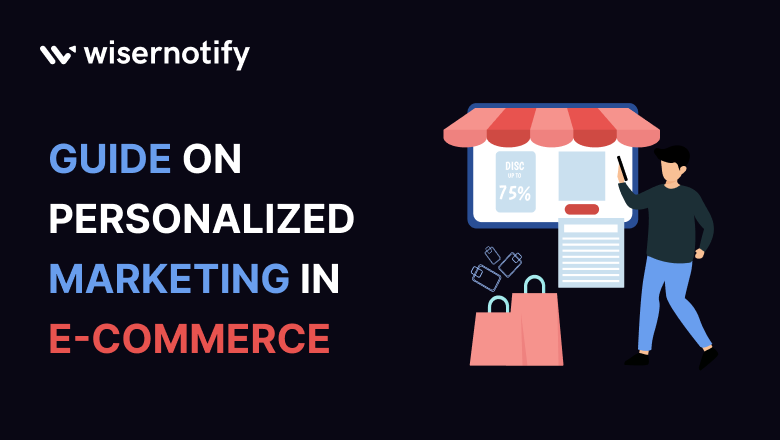Welcome to the era where customers no longer hope for a personalized shopping experience—they expect it.
Gone are the days of one-size-fits-all marketing.
Today, e-commerce buying is a vibrant mosaic of individual preferences, tastes, and choices.
As digital marketers, owners, and agencies steering the future of e-commerce brands, tapping into the power of personalized marketing isn’t just advantageous; it’s essential.
This guide isn’t just another walkthrough filled with jargon and unattainable strategies.
It’s your practical companion to navigating the personalized marketing universe, tailored for the real challenges and opportunities e-commerce faces today.
Let’s dive in and explore how you can transform your approach to truly resonate with your audience, driving not just sales but lasting loyalty through successful personalized marketing strategies.
Build trust & FOMO
Highlight real-time activities like reviews, sales & sign-ups.
![]()
What is Ecommerce Personalization?
Ecommerce personalization is the practice of tailoring online shopping experiences to individual customers based on their preferences, behavior, and demographics.
It involves delivering relevant content, product recommendations and offers to enhance customer satisfaction, engagement, and conversion rates.
By providing a personalized shopping journey, ecommerce businesses can increase customer loyalty, drive repeat purchases, and boost sales.
By leveraging customer data and behavior, ecommerce businesses can create targeted marketing strategies that foster interaction, drive brand loyalty, and convert.
Importance of Personalized Marketing in E-Commerce
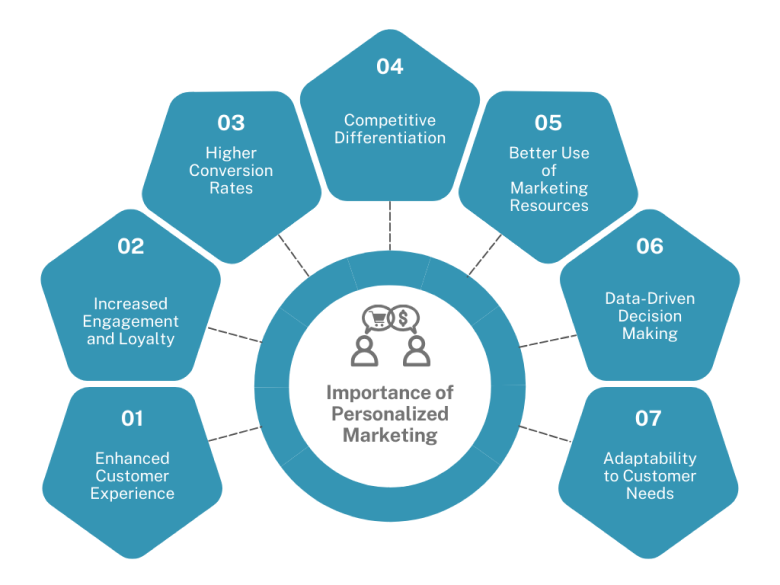
- Better Customer Experience:
Personalization tailors the shopping journey to individual preferences, making it more engaging and satisfying.
For example, Glossier personalizes its marketing messages to its customers based on their beauty preferences and past purchases. This way, customers will see products and content that resonate with their unique beauty routines, making the user experience on their platform more enjoyable.
- More Engagement and Loyalty:Personalized strategies that make customers feel understood and valued create deeper connections, leading to repeat business and long-term loyalty.For Example, Peloton offers personalized workout plans and class recommendations based on users’ fitness levels and workout history. This personal touch engages users more with the product and builds a strong community around shared fitness goals.
- Higher Conversion Rates:Targeted recommendations and personalized communications resonate more with customers, leading to higher conversions.
For Example, Bonobos uses personalized email marketing to suggest clothing options based on a customer’s previous purchases and browsing history. This has resulted in higher email open rates and conversions as customers receive recommendations that match their style and fit preferences. - Competitive Differentiation:In a crowded market, personalized marketing allows brands to stand out by offering unique, customized experiences that competitors can’t.For Example, Warby Parker’s virtual try-on app is a personalized shopping experience that differentiates it from other eyewear brands.
- Better Use of Marketing Resources:By focusing on targeted segments and personalized content, businesses can allocate their marketing resources more efficiently, achieving a higher ROI.For Example, Coca-Cola’s Share a Coke campaign, which personalized bottles with names, showed how targeted personalization can yield significant marketing results with a focused budget.
- Data-Driven Decision Making:Personalized marketing relies on customer data and analytics, enabling brands to make informed decisions and continuously refine their marketing strategies based on real insights.For Example, Spotify uses streaming data to personalize playlists and inform artists and record labels about listening trends so they can make better music production decisions.
- Adaptability to Customer Needs:Personalization strategies can adapt quickly to changing customer preferences and market trends, keeping the brand relevant and responsive.For Example, Zara’s fast-fashion model uses customer feedback and purchase data to adapt its clothing lines to fast-fashion trends, so its offerings always match customer demand.
Understanding Customer Needs: A Data Journey
Data is the compass that helps e-commerce brands navigate the ocean of customer preferences and behaviors.
This tool turns data into insights so brands can deliver what customers want when they want it, forming a robust ecommerce personalization strategy.
Using information from customer interactions—whether through purchase transactions, website browsing, or social media engagement—brands can create marketing that resonates personally.
Effective segmentation and research into personalization technologies can significantly impact revenue and brand loyalty, optimizing ecommerce operations and creating tailored shopping experiences.
From the Field: Take Netflix’s content recommendations.
Ever wonder how they know what shows and movies you love?
This is achieved by complex viewing pattern analysis, so understanding customer preferences through data means highly personalized experiences.
Navigating the Future with Predictive Analytics
The evolution of data analysis through AI and machine learning is a step from understanding current preferences to predicting future behavior. Ecommerce personalization trends leverage machine learning and AI to identify and cater to new customer segments.
These technologies help businesses analyze customer behavior in real-time, allowing for tailored marketing strategies and creating specialized landing pages that resonate with current consumer interests.
This predictive capability is a compass, guiding marketing strategies to meet and beat customer needs.
Do: Start with accessible analytics platforms like Google Analytics to get insight into customer behavior and preferences.
Find trends and test marketing initiatives to see what works with your audience.
Success is in testing, learning, and adapting, so every marketing move is data-driven.
Personalization Across Channels: The Omnichannel Challenge
1. One Experience Everywhere
Your customers don’t see channels; they see your brand.
Whether scrolling through social media, browsing your website, or walking into a physical store, their experience should be seamless and personalized.
This omnichannel approach might sound scary, but it’s all about connecting the dots between different platforms to create a one-to-one customer experience.
2. The Power of Mobile
Think of mobile as your secret weapon.
More than 50% of web traffic is from mobile devices. Personalizing your mobile app or website for interactions can boost engagement big time.
For example, Urban Outfitters uses its mobile app to send push notifications about products customers have shown interest in based on their browsing behavior.
Also read: 10 Impactful Push Notification CTA Examples to Use in 2024
This is proactive, keeps the brand at the top of the mind, and encourages app users to complete the purchase.
3. Email Personalization: Beyond “Dear [Name]”
Email marketing remains a powerful tool in your omnichannel strategy, especially when personalized.
It’s not just about using the customer’s name; it’s about tailoring the content to their interests and engaging loyal customers.
ASOS does this well by sending emails that show new arrivals, sales or exclusive offers in the categories the customer shops most. They also send reminders for items left in the cart, personalization, and a nudge to convert.
To retain loyal customers, various approaches such as targeted email campaigns, loyalty programs, and dynamic content cater to their preferences and buying habits, ultimately enhancing their overall shopping experience.
They use personalized subject lines to grab attention.
Strategy: One seamless customer journey is Nike’s approach to integrating its app, website, and stores.
Using their app customers can scan QR codes in-store to get product info, check stock and even reserve items to try on.
It’s omnichannel personalization at its best, as well as an overall customer experience.
4. The Integration Problem in Ecommerce Personalization Strategy
Breaking down data silos is the first step to a single customer view.
Investing in a Customer Data Platform (CDP) can be a big win.
It allows you to aggregate and activate customer data across all touchpoints in real time to supercharge your personalization.
Quick Fix: Even if a CDP is too big of an ask right now, start by getting your marketing tools to talk to each other.
Use Zapier to create simple integrations between your CRM, email platform, and analytics tools.
It’s about the data working for you, not the other way around, so your marketing team can create personalized campaigns.
Amazon’s Strategies for E-commerce Growth
Learning from the Titan
Amazon might seem like a big ask from where you are now but its strategies are based on principles any e-commerce brand can apply. One key principle is catering to new customers by utilizing personalized marketing strategies to create a welcoming experience.
Their secret sauce? A customer data obsession.
Amazon creates personalized marketing campaigns that speak directly to customers’ individual preferences using machine learning and a customer data platform. Techniques such as targeted promotions and tailored content help new users familiarize themselves with the brand and its offerings, ultimately enhancing engagement and increasing customer loyalty.
Takeaway: Highlight personalization in your product recommendations.
Use browsing and purchase history to suggest products your customers will likely buy.
Tools like Nosto or Adobe Experience Cloud can automate this for you and bring Amazon-level personalization within the reach of your marketing personalization strategy.
Also read: 8 Website Personalization Tools That Will Wow Your Visitors
Build trust & FOMO
Highlight real-time activities like reviews, sales & sign-ups.
E-commerce Psychological Triggers
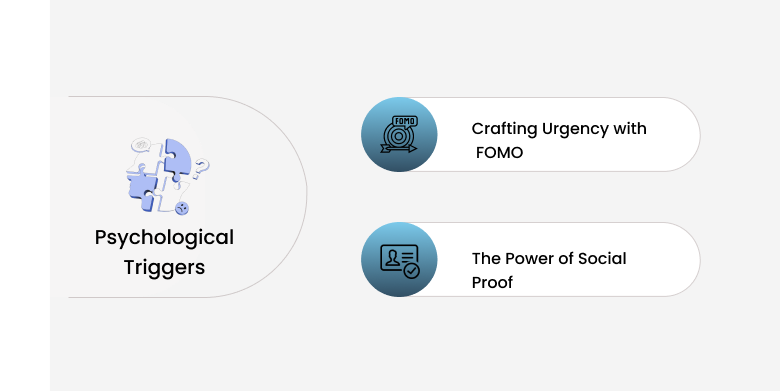
Crafting Urgency with FOMO
The “Fear of Missing Out” is a powerful psychological trigger. It’s not just about creating urgency; it’s about making your customers feel part of something exclusive. Personalized customer service can enhance this experience by addressing customers by name and offering tailored solutions to their issues.
Actionable: Limited time offers on your site can drive immediate action.
Implement personalized marketing strategies that use personalized subject lines in emails or custom video messages to promote these offers and make them valuable so you don’t lose trust and loyalty.
The Social Proof
Social proof has a big impact on buying decisions.
It’s the digital version of word of mouth recommendations, essential for customer satisfaction and loyalty.
Strategy: Ask happy customers to leave reviews and share their purchases on social media.
Use tools like WiserNotify, Yotpo or Trustpilot to automate this.
Promoting these testimonials across your channels builds credibility and trust, two key components of a personalization strategy.
Personalization Challenges
Data Privacy
Customer privacy is non negotiable.
Transparency in collecting, using and protecting customer data is key, that’s why personalization is important.
Best Practice: Always ask for consent before collecting data and be clear about its use.
GDPR compliant practices can set the standard for data privacy and build customer trust so your marketing works and is ethical.
Data Simplification
Data integration problems are often caused by consumer data silos. A single customer view is key but can be tricky.
Solution: Integrating your CRM and email platform is a simple but big win to get you sending more personalized communications.
Tools like Segment can simplify data integration across multiple platforms and supercharge your personalization and customer experience.
Selecting E-commerce Personalization Tools
Choosing the right tools is the key to a successful personalization strategy.
Your tool should give you deep insights into customer behavior and preferences with AI infrastructure and machine learning for dynamic personalization.
The Essentials Checklist (Extended):
- Marketing Automation: Choose tools that support marketing automation so your marketing team can create personalized campaigns and manage personalized interactions across multiple channels.
- Behavioral Data Analysis: Select platforms that give you detailed behavioral data so you can segment specific performance analysis and personalized marketing that speaks to your audience.
Quick Tip: Use marketing tech that integrates with 3rd party data providers to supercharge your data collection and more granular personalization.
Advanced-Data in E-commerce
Personalizing with Big Data
Big data is at the heart of marketing tech and the backbone of personalization in e-commerce.
Netflix’s Masterclass
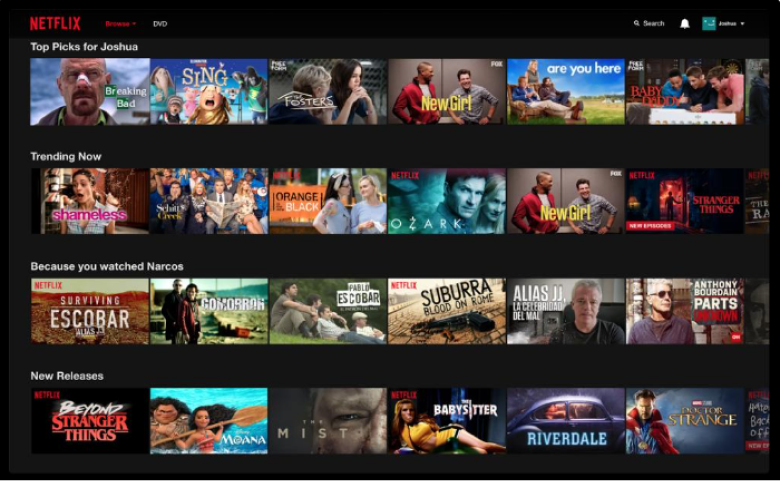
Netflix’s recommendation engine isn’t just smart, it’s a personalization masterclass.
By analyzing huge amounts of behavioral data Netflix doesn’t just suggest what you might like, it knows your viewing habits inside out.
Big data and machine learning are in sync, delivering a personalized customer experience that keeps customers coming back.
Imagine applying Netflix’s model to your e-commerce site.
You could dynamically change product recommendations based on what customers have bought and how they interact with your site.
Did they watch a product video?
This would increase the chances of similar products showing up in their recommendations.
Actionable: Use your e-commerce platform’s customer browsing and purchase data to customize product images and copy.
If your data shows a segment likes eco-friendly products, highlight those features and make personalization more personal.
Predictive Analytics for Personalized Promotions
Predictive analytics, powered by machine learning, transforms sales and promotions into highly targeted, effective campaigns.
By analyzing behavioral data and purchase history, predictive models can forecast future buying behaviors, enabling personalized marketing efforts that hit the mark every time.
Practical Step: Deploy predictive analytics tools to fine-tune the timing and relevance of your promotions.
Personalized email marketing campaigns that offer discounts on predicted interests can significantly boost conversion rates, illustrating the importance of a sophisticated marketing personalization strategy.
The E-commerce Customer Journey
The e-commerce customer journey goes way beyond the “Buy” button, emphasizing the significance of personalized shopping experiences.
Post purchase personalization is key to turning one time buyers into lifetime customers, so customer retention strategies are key to building brand loyalty. These tailored interactions not only enhance customer satisfaction but also drive future engagement and higher conversion rates.
A Seamless Path to Purchase
Personalization simplifies the path from discovery to purchase, guiding customers through a personalized experience that anticipates their needs and wants.
Deep Dive: Use AI powered chatbots to offer personalized product discovery.
Chatbot tools can suggest products based on customer questions and past behavior so recommendations feel personal and intuitive and improve overall customer experience and engagement.
Post Purchase Engagement
Post purchase engagement strategies like personalized thank you messages and customized upsells deepen the customer brand relationship.
Implement a loyalty program that remembers and rewards customers based on their preferences and purchase history and you’ll see big customer satisfaction and loyalty gains.
Actionable: Create personalized email workflows triggered by specific purchase behavior.
For example, after a customer buys a specialty coffee brewer, send them not just a thank you email but a follow up with curated content like brewing guides, tips for bean selection or an invite to a virtual coffee tasting event.
These actions follow up on the purchase, deepen the brand relationship and set up future engagement.
E-commerce Personalization Metrics
Knowing and predicting customer lifetime value (LTV) allows you to target and budget marketing more effectively.
Advanced: Use machine learning models to analyze early customer interactions and predict LTV.
This helps you personalize and retain high-value customers and get the most ROI from personalized marketing campaigns.
Segment-Level Performance Analysis
Analyzing personalized marketing at the segment level gives you insights to refine and improve future strategies.
Tools with detailed behavioral metrics and customer feedback mechanisms are key to adjusting personalization to meet and exceed customer expectations.
Implementation: Monitor the performance of personalized campaigns across customer segments and see what works.
This data driven approach means personalization strategies stay agile, responsive and get better over time.
Social Media: The Hub of E-commerce Personalization
Social media platforms offer personalized marketing opportunities and direct customer engagement through personalized content, targeted ads, and interactive campaigns.
Influencer Collaborations That Work
- Partner with influencers that are aligned with your brand and get authentic personalized content that speaks directly to your audience and drives engagement and loyalty.
Personalization Through Conversational Marketing
- Using conversational marketing tactics on social media like personalized chatbot interactions can improve the shopping experience and make it feel more personal and engaging.
Custom Audiences for Hyper-targeted Ads
- Using social media’s advanced targeting capabilities, you can create custom audiences for hyper-personalized advertising, so marketing messages are tailored to potential customers’ interests, behavior, and preferences.
Personalization with Gamification
Gamification in personalized marketing for D2C e-commerce brands is a great way to engage customers directly, improve the shopping experience, and build brand loyalty.
Here’s how D2C brands can do gamification with actionable and insightful tips:
Do you want to dive deeper? Here you go: E-commerce Gamification: 3 Genius Examples + Your Roadmap
Custom Challenges to Drive Customer Engagement
Actionable: Dive into your customer analytics and find trends and preferences specific to your D2C brand.
Say your brand is eco-friendly home goods.
Then, you could create a “Sustainable Living Challenge” and ask customers to share their eco-friendly habits to win exclusive discounts or early access to new products.
Action: Personalize the challenge rewards to your customer segments.
For example, customers who have shown a preference for kitchen products might get rewards that apply to your latest line of compostable kitchenware.
This incentivizes participation, aligns with their values and interests, and builds loyalty.
Reward Systems that Match Customer Preferences
Actionable: Create a multi-faceted reward system that acknowledges customer interactions, from social shares to product reviews.
This recognizes and values how customers interact with your D2C brand.
Action: Offer tiered rewards for different levels of engagement.
Customers who engage with your brand frequently could unlock VIP status, which would give them access to exclusive content, special discounts, or first dibs on new products.
Use personalized emails to notify customers of their progress and upcoming rewards to keep engagement high and personalized.
Gamified Quizzes for Product Discovery
Actionable: Use quizzes to guide customers to products that fit their needs and preferences and turn the often overwhelming product discovery process into a fun experience.
Action: Make quiz results based on the individual’s previous interactions with your brand.
If someone has been browsing outdoor furniture, the quiz could suggest items that would fit an outdoor living space, like eco-friendly fire pits or weather-resistant rugs.
Follow up with personalized email content that goes deeper into their interests and reinforces the personal touch.
Building Community with Leaderboards
Actionable: Leaderboards can turn individual achievements into community celebrations.
For a D2C fitness apparel brand, this could mean creating a leaderboard for a virtual workout challenge where customers log workouts to climb the ranks and earn rewards.
Action: Keep the community engaged by segmenting leaderboards by activity levels or interests.
Showcasing customer achievements in your newsletters or on social media gives them a moment of fame and builds the community.
Offer rewards that match the community’s values, like exclusive access to a virtual workout session with a famous trainer.
D2C e-commerce brands can create a more interactive shopping experience by doing these gamification strategies.
These drive customer engagement and loyalty and give brands rich data to refine and personalize the customer journey.
Build trust & FOMO
Highlight real-time activities like reviews, sales & sign-ups.
Semantic Understanding for Personalized Search
Semantic understanding is a crucial aspect of personalized search in ecommerce. It involves using intelligent search algorithms that can understand the context and intent behind a customer’s search query.
By analyzing search data and customer behavior, ecommerce businesses can provide more accurate and relevant search results, leading to higher conversion rates and customer satisfaction.
For example, a customer searching for “summer dresses” on an ecommerce site may be shown a curated selection of dresses that match their previous browsing history and purchase behavior. This personalized search experience can help customers find what they’re looking for quickly and efficiently, reducing bounce rates and increasing the chances of a sale.
Implementing Personalization
Implementing personalization in ecommerce requires a strategic approach. Here are some key steps to consider:
- Collect and analyze customer data: Gather data on customer behavior, preferences, and demographics to create a comprehensive customer profile.
- Segment customers: Divide customers into segments based on their behavior, preferences, and demographics to create targeted marketing strategies.
- Choose personalization tactics: Select the most effective personalization tactics for your business, such as product recommendations, email marketing, and social media targeting.
- Monitor and optimize: Continuously monitor the performance of your personalization efforts and optimize your strategies to improve results.
By following these steps, ecommerce businesses can create a personalized shopping experience that drives customer engagement, loyalty, and sales.
Let Your Customers “Opt-In” to Personalization
In today’s digital age, customers are increasingly concerned about their data privacy. To build trust and ensure transparency, ecommerce businesses should allow customers to “opt-in” to personalization.
This involves clearly informing customers about how their data will be used and giving them control over their personalization preferences.
For example, a customer may be prompted to select their gender and age group when subscribing to a newsletter, allowing the ecommerce business to provide personalized offers and recommendations. Ecommerce businesses can build trust and create a more personalized shopping experience by giving customers control over their personalization preferences.
E-commerce Personalization Case Studies
Let’s see how e-commerce brands are turning strategies into results.
These case studies show the power of personalization and give ideas that can be applied across the e-commerce industry.
1. Stitch Fix: Personalization in Fashion
Stitch Fix is a fashion brand that stands out by offering a very personalized shopping experience.
This e-commerce brand combines data analytics with the expertise of personal stylists to curate boxes of clothing that fit individual customer preferences, sizes and style requirements.
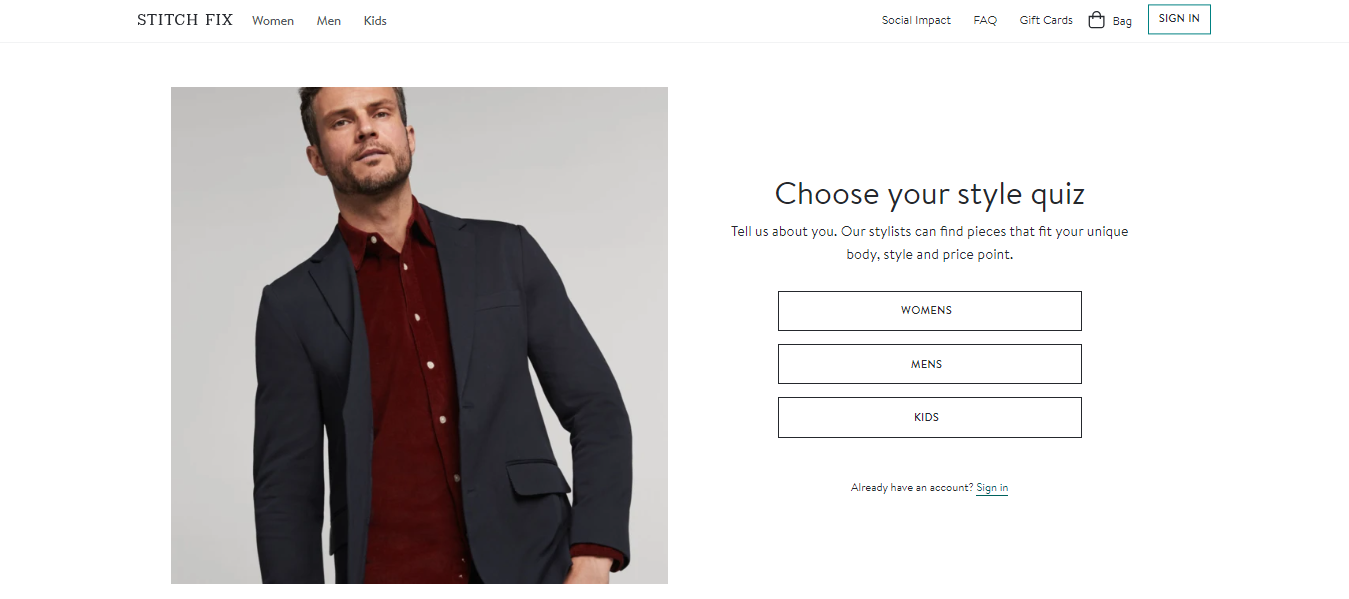
- Strategy: Customers fill out detailed beauty profiles, Sephora’s algorithms analyze and match them with products. Beauty experts then curate personalized product sets for each customer, blending tech with human touch.
- Result: This personalized approach has driven high customer satisfaction, retention and growth through word of mouth. Sephora can refine its recommendations based on customer feedback and purchase history which is the power of data driven personalization in building meaningful customer relationships.
2. Sephora: Enhancing Beauty Shopping with Tailored Experiences
Sephora uses personalization to give customers a beauty shopping experience that’s tailored to their skin care needs and makeup preferences.
Through its Beauty Insider loyalty program Sephora collects valuable customer data to personalize product recommendations, offers and content across channels.
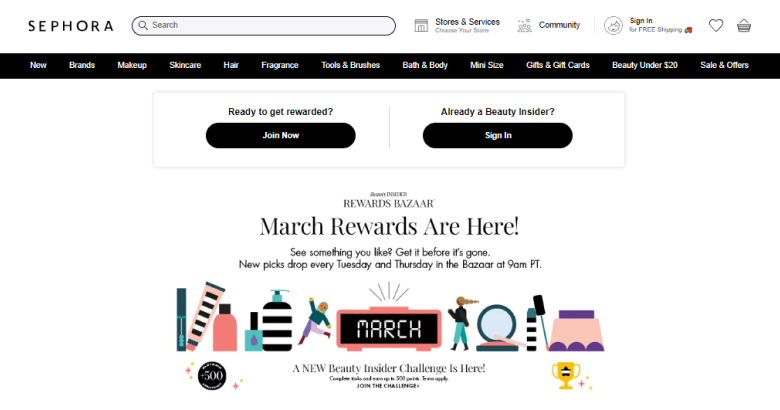
- Strategy: Sephora uses in-store technology like Color IQ to match products to customers’ skin tones and preferences. Online the brand uses purchase history and preferences to recommend new products and tutorials, so every marketing message feels personal.
- Result: Sephora’s personalization has driven sales and customer loyalty and made the brand a leader in customer centric retail in the beauty industry.
3. The North Face: Personalized Outdoor Gear Recommendations
The North Face created a personalized marketing strategy to help customers find the right outdoor gear.
The North Face introduced XPLR Pass, an AI-powered tool that makes product recommendations based on weather conditions, activity type, and customer preferences.
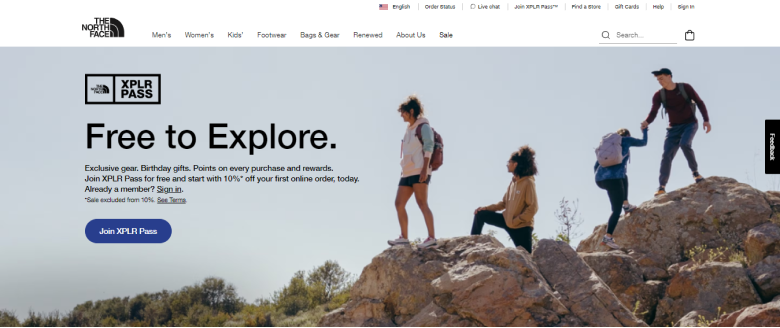
- Strategy: Customers answer a series of questions through an interactive online platform. The AI then matches this against The North Face’s product database to recommend the best gear.
- Result: This resulted in a more interactive online shopping experience, higher customer satisfaction, and higher conversion rates. It showed how brands can use personalization to simplify the customer’s decision-making process and get direct business results.
By being customer-centric and using data and technology, brands like Stitch Fix, Sephora, and The North Face are setting the bar for personalization.
They show that understanding and serving individual customer needs is the key to long-term success and loyalty in the digital age.
Summary: Personalization Strategies of the Future
As e-commerce evolves the importance of personalization strategies becomes more apparent.
E-commerce brands can grow and have a loyal customer base by using advanced data analytics, AI, and machine learning and creating seamless personalization across all touchpoints.
E-commerce is about delivering personalization that meets and beats customer expectations, success, and innovation in a crowded market.
By staying current with the latest trends and technologies and iterating and refining personalization strategies, e-commerce brands can build more meaningful relationships with their customers and create experiences that thrill, engage, and inspire.
